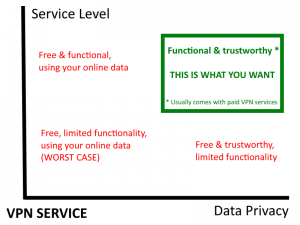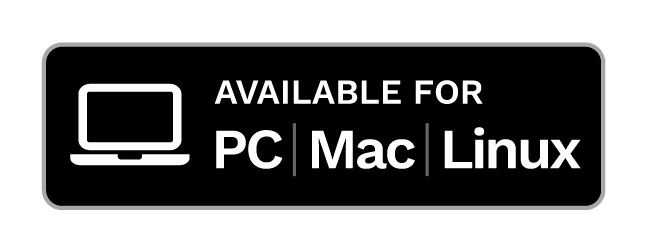Are Free VPNs Safe and Trustworthy? What to Look at When Choosing

How Do I Know If My Free VPN is Safe and Trustworthy?
There has been a lot of news coverage around the rollback of certain Internet privacy regulations in the US. Not a long while ago, the US Congress voted to allow Internet Service Providers (ISPs) to monitor and sell the data about the online activity of their customers. So, from this point on, if you don’t want any third parties to have access to what you do online, your best option is to start using a Virtual Private Network (VPN).
VPNs are the best way to anonymize your web traffic. When using a VPN service, your ISP can only see that you’re connected to a remote VPN server and will not be able to make out the pages or content viewed.
Seems like an easy solution, but what if we were to tell you that your online activity data may still be for sale, even with a VPN? Unfortunately, not all VPN providers have your best interests in mind, and running all those servers costs real money. If you’re using a “free” VPN, you may actually be paying for the service in other ways, like with your private browsing data! Keep reading to see how to tell if your free VPN is safe and trustworthy and how to actually choose one that can protect you.
How VPNs Make Money – the Truth About “Free” VPNs and Their Trustworthiness
Aside the technology (features), which sets every VPN solution apart from others, the common core for all is the server network, through which users connect and run their traffic. That traffic has costs which are supported by the VPN company. Whether they are leasing the servers or they have bought their own, the costs are still there and need to be covered.
Each VPN company has its own strategy of covering those VPN server costs; what’s important to you is to make sure that the privacy level you sign up for is respected and you get the best bang for your buck in terms of functionalities and performance that you expect from a VPN solution.
The Dark Side of Free VPNs and How to Choose a Safe VPN Provider
If you don’t want third parties to know what you’re doing online, we recommend not to use a free VPN solution. That’s right – do not use a VPN solution that is totally free. We’re not talking here about providers, such as Speedify, who minimize the traffic costs by limiting the free volume of data each month, but especially about VPN providers where everything is “free”, at least apparently.
Think about it – a VPN that’s totally free is a service provided to you with all associated costs; we all know nothing’s for free today, so, how does it all add up for the companies to make their money to support this service? They have 2 ways to leverage this: by modifying the service level and by using the data you’re providing them (after all, they do have all your data…):

Unless they are financed by a charitable foundation or laundering money, a business needs money to keep on functioning and to grow. Starting from the image above, assuming that the service is provided 24/7 for unlimited traffic, here are some of the most used methods to make money free VPN providers use:
- Best case scenario: limiting functionalities. They will not allow you to use all the servers they run – you may even miss entire countries from the “free” servers list, not to mention the inherent service interruptions – not being able to access certain services due to spam / DDoS attacks coming from the same IP, maybe from another user of the same free VPN you’re using. They most surely will not permit running P2P applications via their service and/or they may even restrict the platforms you can use their VPN solution (e.g. only Windows).
In this case, VPN companies minimize their costs by using the cheapest servers for traffic and cutting down on free usage. - Using annoying and irrelevant ads in the interface, recommending all sorts of apps or services. Don’t you just “love” an ad for an application or service which you are not at all interested in? Or that maybe you already have? Or that’s malware (yes, we’ve seen that!) Especially when it pops-up as a notification on your phone or on your desktop… Point taken!
- Worst case scenario: selling your online activity data to third parties. This is the worst because it defies the very reason why you would choose to use a VPN – to have online privacy! VPN companies are generally binded by the privacy laws of the country / state they’re incorporated / registered in. Plus – they can have their own terms in the privacy policy that many people don’t even bother to check before signing-up.
So – do a little research about the company and their privacy policy! We even recommend asking the company directly where they stand on user data collection within the VPN sessions – do they gather it? Do they sell it? Do they anonymize it?
Free VPN vs. Paid VPN – Which One is Safer?
It’s generally better to use a paid VPN service. At least you’ll get all the bells & whistles and, in most cases, your online activity will be safe.
But – you should nevertheless check what that company does with your online activity data – if they collect it / disclose it to third parties, etc. Be especially careful with companies that offer a totally free service and also a paid one (they might call it “select” / “premium” / “elite”, etc.) – both service levels might have the same privacy policy / user terms, so it’s possibly you’re only getting more functionalities, many of which you may not even use.
Where Does Speedify Stand on Privacy?
First of all, Speedify does not offer any totally free tier of service. You can use Speedify for free, but we will secure & optimize up to 2 GB of data each month. If you’re one of the 99% that needs more than that, then you’ll sign-up for a subscription, as many others do.
Second – you will not see any ads within Speedify’s user interface, period! As VPN users ourselves, we don’t like ads, but we like to use Speedify for its unique capabilities – using multiple Internet connections at the same time, failover, fast encryption, mobility, etc. So, it is our firm commitment that we don’t run any ads with Speedify.
It’s no secret – our revenue source for Speedify is the monthly / yearly subscriptions customers pay for. We also have a number of Speedify for Teams corporate deals going on, given the fact that our software-only channel bonding solution does with prices starting $50 / year what complex hardware setups do at $3,000+.
To the point of privacy, Speedify is developed by Connectify Inc, based in Philadelphia, PA. Within its VPN service, Speedify does not collect any user data and does not supply it or sell it to third parties. Feel free to check our Privacy Policy.
To wrap this up: do your homework and research the VPN company you want to use about their service (free or paid) – the Privacy Policy / User Agreement are the first places to check. Free VPNs can be safe, but most of them aren’t!
Download Speedify
Speedify is the only app that combines your wifi, cellular, wired, and even your friend’s phone signals – into one ultra-fast and super secure link that keeps you all connected for the best possible live streaming, video calling, or just posting to your favorite app.
Subscribe to Speedify on YouTube
Get news, success stories, and our weekly livestreaming show Speedify LIVE! Tune in to chat and ask questions or to yell at us if that makes you happy. We're from Philly, we can take it.




